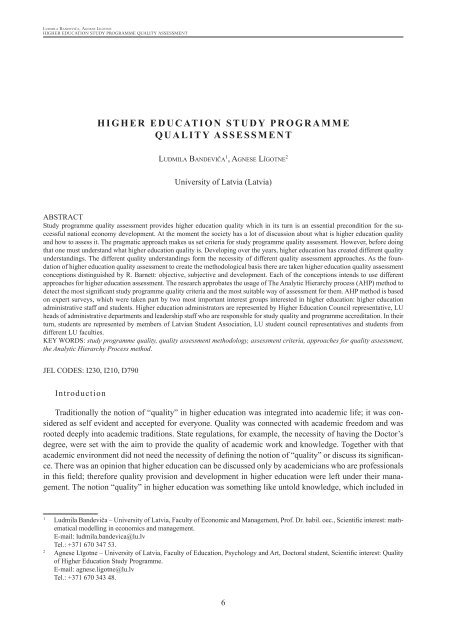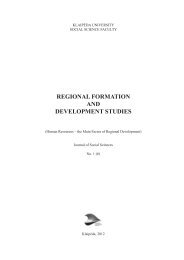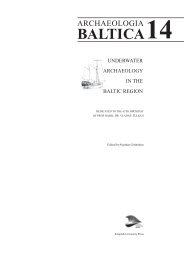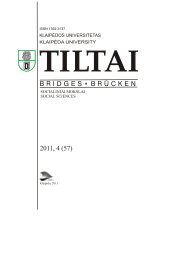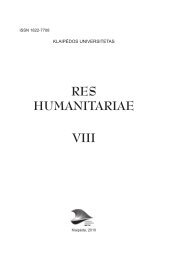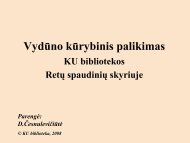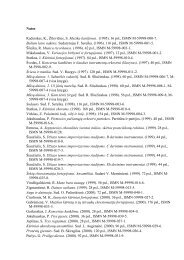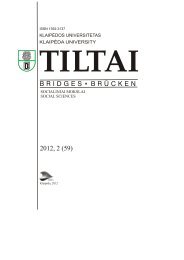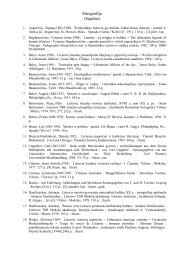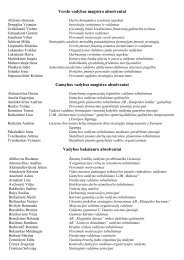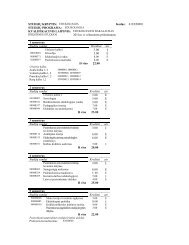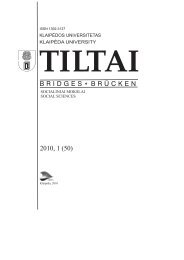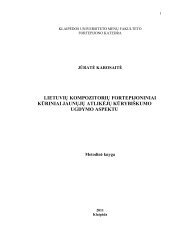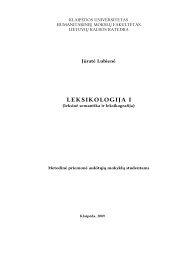regional formation and development studies - KlaipÄdos universitetas
regional formation and development studies - KlaipÄdos universitetas
regional formation and development studies - KlaipÄdos universitetas
You also want an ePaper? Increase the reach of your titles
YUMPU automatically turns print PDFs into web optimized ePapers that Google loves.
Ludmila B<strong>and</strong>eviča, Agnese Līgotne<br />
HIGHER EDUCATION STUDY PROGRAMME QUALITY ASSESSMENT<br />
HIGHER EDUCATION STUDY PROGRAMME<br />
QUALITY ASSESSMENT<br />
Ludmila B<strong>and</strong>eviča 1 , Agnese Līgotne 2<br />
University of Latvia (Latvia)<br />
ABSTRACT<br />
Study programme quality assessment provides higher education quality which in its turn is an essential precondition for the successful<br />
national economy <strong>development</strong>. At the moment the society has a lot of discussion about what is higher education quality<br />
<strong>and</strong> how to assess it. The pragmatic approach makes us set criteria for study programme quality assessment. However, before doing<br />
that one must underst<strong>and</strong> what higher education quality is. Developing over the years, higher education has created different quality<br />
underst<strong>and</strong>ings. The different quality underst<strong>and</strong>ings form the necessity of different quality assessment approaches. As the foundation<br />
of higher education quality assessment to create the methodological basis there are taken higher education quality assessment<br />
conceptions distinguished by R. Barnett: objective, subjective <strong>and</strong> <strong>development</strong>. Each of the conceptions intends to use different<br />
approaches for higher education assessment. The research approbates the usage of The Analytic Hierarchy process (AHP) method to<br />
detect the most significant study programme quality criteria <strong>and</strong> the most suitable way of assessment for them. AHP method is based<br />
on expert surveys, which were taken part by two most important interest groups interested in higher education: higher education<br />
administrative staff <strong>and</strong> students. Higher education administrators are represented by Higher Education Council representative, LU<br />
heads of administrative departments <strong>and</strong> leadership staff who are responsible for study quality <strong>and</strong> programme accreditation. In their<br />
turn, students are represented by members of Latvian Student Association, LU student council representatives <strong>and</strong> students from<br />
different LU faculties.<br />
KEY WORDS: study programme quality, quality assessment methodology, assessment criteria, approaches for quality assessment,<br />
the Analytic Hierarchy Process method.<br />
JEL CODES: I230, I210, D790<br />
Introduction<br />
Traditionally the notion of “quality” in higher education was integrated into academic life; it was considered<br />
as self evident <strong>and</strong> accepted for everyone. Quality was connected with academic freedom <strong>and</strong> was<br />
rooted deeply into academic traditions. State regulations, for example, the necessity of having the Doctor’s<br />
degree, were set with the aim to provide the quality of academic work <strong>and</strong> knowledge. Together with that<br />
academic environment did not need the necessity of defining the notion of “quality” or discuss its significance.<br />
There was an opinion that higher education can be discussed only by academicians who are professionals<br />
in this field; therefore quality provision <strong>and</strong> <strong>development</strong> in higher education were left under their management.<br />
The notion “quality” in higher education was something like untold knowledge, which included in<br />
1<br />
Ludmila B<strong>and</strong>eviča – University of Latvia, Faculty of Economic <strong>and</strong> Management, Prof. Dr. habil. oec., Scientific interest: mathematical<br />
modelling in economics <strong>and</strong> management.<br />
E-mail: ludmila.b<strong>and</strong>evica@lu.lv<br />
Tel.: +371 670 347 53.<br />
2<br />
Agnese Līgotne – University of Latvia, Faculty of Education, Psychology <strong>and</strong> Art, Doctoral student, Scientific interest: Quality<br />
of Higher Education Study Programme.<br />
E-mail: agnese.ligotne@lu.lv<br />
Tel.: +371 670 343 48.<br />
6


